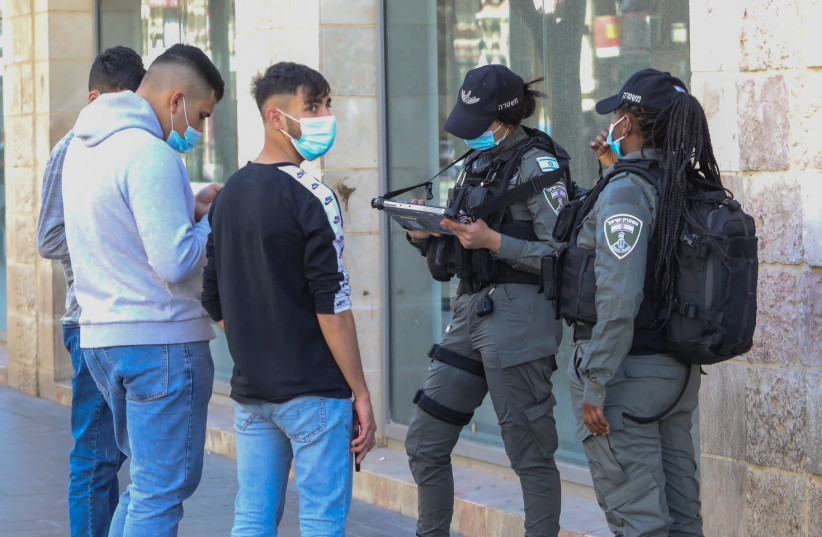The police will be able to verify the location of those quarantining through an SMS.

(photo credit: MARC ISRAEL SELLEM/THE JERUSALEM POST)
Prime Minister Naftali Bennett met with relevant ministers and officials on Sunday to work on stepping up the enforcement of coronavirus regulations, which since last week falls under the responsibility of the Public Security Ministry.
The authorities are working to ensure that the enforcement system will combine the use of technological means as well as of police officers and local inspectors.
It was decided that verified coronavirus carriers who breach isolation will be criminally charged.
In addition, Bennett gave instruction to the ministry and the attorney general to regulate the legal aspect of employing technological tools to monitor those in quarantine, including allowing the police to verify the location of individuals in isolation through an SMS system.
In addition, it was announced that priority in enforcement will be given to weddings and another events considered at high risk of spreading infections.
Starting from Wednesday, access to indoor weddings and parties with over 100 participants, will be reserved only to individuals who are vaccinated, recovered or have a negative corona test, or holders of what the government has dubbed “Happy Badge.”
“Our goal is to establish sensible guidelines, alongside aggressive and effective enforcement against violators,” Bennett said. “Anyone who violates the guidelines endangers his health and the health of the rest of the citizens of Israel. We will not allow this. The Delta variant is soaring all over the world. Implementing regulations in the field is a critical element in fighting the pandemic to defeat the mutation.”
Earlier in the day, Health Minister Nitzan Horowitz said that the possibility of another lockdown exists, but the government is not considering it as of now and the goal is to avoid it.
“Of course it is possible that there will be another lockdown, but we are not discussing it now,” Horowitz said in an interview to Army Radio. “Everyone can understand that if there is a huge outbreak here, including in serious morbidity, we will get there. We are taking measures so that we are not going to need it.”
Some 430 new virus carriers were identified on Saturday, with 1.47% of the 33,000 tests processed returning a positive result. The previous day the cases were 1,120 out of 76,000 tests – the highest since March.
At the beginning of June, Israel was registering some 10-20 new cases a day. The new outbreak apparently started in some schools and quickly spread.
While the increase in serious morbidity – which is considered the most important parameter to consider – has remained limited, the number of patients in serious condition is nonetheless on the rise. Some 63 patients were in serious conditions on Sunday morning. Four weeks ago, they were 19.
On Saturday, a group of experts from Hebrew University released a document warning that the figure will hit 100 by the first half of August.
At the peak on the pandemic in January, there were some 1,200 patients in serious condition, a number that placed unprecedented strain on the country’s health system. Months before, experts were suggesting that Israeli hospitals could handle up to 700-800 serious patients without compromising the quality of the care.
On Friday, Bennett said that the Pfizer is less effective against the Delta variant, which currently represents the vast majority of cases in Israel.
“We do not know exactly to what degree the vaccine helps, but it is significantly less,” he noted.
As reported by The Jerusalem Post
